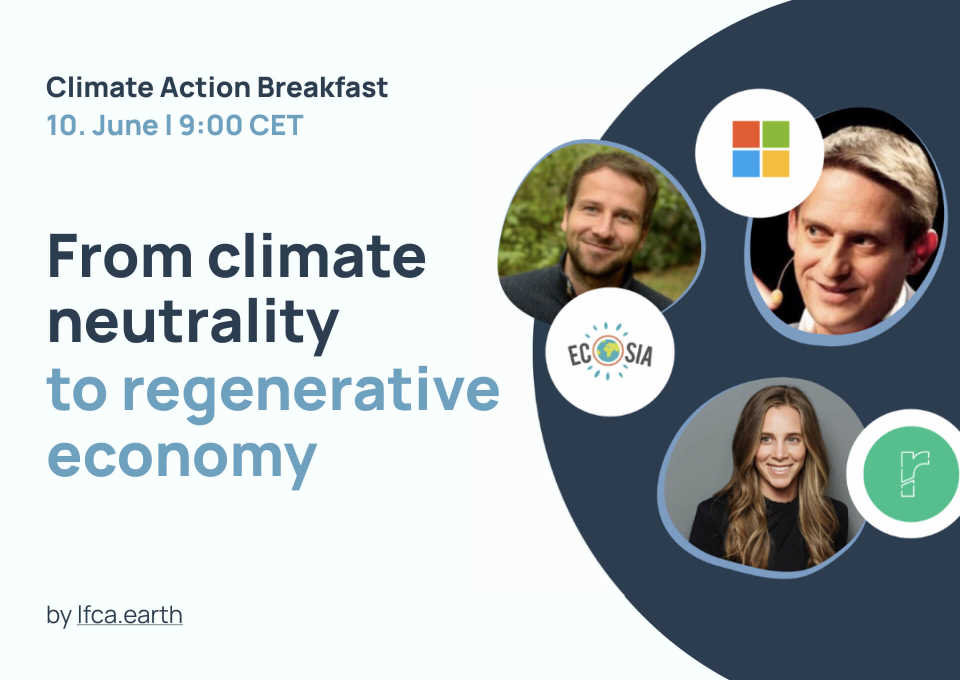Reaching climate neutrality by measuring and offsetting your emissions is an important first step, but it's just the start and not the end of your journey. We need a mindset change from perceiving this first step as an end-goal, towards thinking about how we can build a system that positively impacts our society and our planet. But what should businesses do to be active drivers of change?
On the 10th of June 2021, we gathered with the members of our community to talk about regenerative economy and to discuss the possibilities that every one of us has to move from limiting damages to actually giving back resources to the planet. To do so, three inspiring speakers from pioneering companies have shared their insights and views on how to build a regenerative system.
Christian Kroll - Ecosia: Sustainability should be substituted with Regeneration
First speaker at the event was Christian Kroll, Founder and CEO of Ecosia, the search engine that plants trees. Ecosia is heavily stressing the importance of a regenerative approach, and is now a frontrunner in climate positivity. In order to do so, Ecosia has put together a whole regenerative economy strategy that invests in solar energy, trees and regenerative agriculture. This system makes them run on more than 300% renewable energy, to the point where every Ecosia search not only does not pollute, but takes away 1kg of CO2 from the atmosphere.
We need to become part of the solution and not only stop being part of the problem.
Without stopping there, Ecosia intends to be a role model in this transition and in his intervention, Kroll shared two Ecosia initiatives that can help other companies towards regenerative models:
Ecosia Trees - to help companies that want to start sustainable tree planting.
Climate Action Energy Fund - to allow other companies and individuals to invest in renewable energy.
Two other projects in the pipeline, a Nature Fund and a Climate-Tech fund, will be announced soon.

Nicolas Gaume - Microsoft: If you want to do the right thing, you need to do it to the maximum
Second speaker of the event was Nicolas Gaume, currently collaborating with the executive president and vice president of Microsoft on their climate pledge. In January 2020 Microsoft committed not only to be carbon negative but to take responsibility for the impact that such a giant of the tech industry had over the years, deciding to remove all of their historical emissions from the environment by 2050. In parallel, they decided to contribute to a variety of topics, such as biodiversity, waste, water consumption and, of course, carbon. In order to do so, the following initiatives were launched:
A one-billion-dollars Climate Innovation Fund.
The “AI for Earth” initiative, to support biodiversity restoration by putting technology at the service of nature.
Recycling centres that allow recycling of servers entirely.
The Green Software Foundation, co-founded with other leading actors in the tech industry and non-profits (among which, also LFCA, Ed.) to reduce software related footprint and pollution. On this same purpose, Microsoft started working on 24/7 carbon matching with Vattenfall in Sweden to make sure to run its services with 100% renewable energy.
Gaume remarked how real and effective decarbonization goals are very ambitious, and therefore big companies like Microsoft, with the means and the capacity to take further action, should lead by example. Regardless of the size, every company can come closer to real net-zero targets when taking into account its entire set of historical emissions, considering as part of its footprint not only carbon emissions, but also water usage, waste, and other factors that have a crucial impact on the climate crisis.

Hannah Helmke - right. based on science: We need to go beyond net-zero
The event concluded with the intervention of Hannah Helmke, founder and CEO of “right. based on science”, an organization that develops science-based metrics and software solutions for companies to measure their contribution to global warming in °C, a less abstract measure unit than CO2 values. This way, they can advise their client on which investment decisions would be in alignment with the Paris Agreement and which ones wouldn’t.
Helmke stressed the importance of a scientific approach when talking about impact measurement, by explaining how net-zero targets are not enough to be Paris aligned. For example, to reach the Paris alignment right. Based on science calculated that Amazon would have to reduce its emissions of 120%, then beyond the “net-zero”. This happens because many companies don’t consider other greenhouse gases and often don’t take into account the emissions accumulated. Another problem addressed is then the tendency of outsourcing one’s environmental costs through offsetting. However, offsetting is often harmful to local communities and nature: for example, massive tree planting can have a negative impact on biodiversity if not properly managed. Often, it is not a symptom of change but a way to keep business as usual.
We all know that the transition to the 1.5°C world means change, and offsetting does not require change, so there is something fundamentally wrong with the model
The main objective of right. Based on science is then to find real solutions that can help every stakeholder in the climate transition towards Paris alignment, which requires scientific and tangible indicators and suitable actions for every sector involved. Even if already calculating the carbon footprint is a huge step for many companies, measuring one’s impact in terms of degrees Celsius and temperature increase is the necessary next move to find more realistic and impactful solutions.

A new paradigm for climate action
It is clear that climate neutrality and offsetting are not enough and that we need a total paradigm shift to stop focusing only on hiding our damage. Climate positivity and carbon negativity set new standards for our economic system, forcing us not only to strive for the bare minimum but to aim for a positive outcome for our planet and society.
LFCA has always stressed the importance of considering climate neutrality only as the first step, that should be followed by a focus on reduction of the emissions that we keep causing.
While reduction should stay a priority and an important 'homework' for all of us, what if you can have much more in your power? Can you find a way to reduce the negative impact to zero and become climate positive? Can you take into account emissions that you've generated historically? Can you support innovations that can be game-changers through your investments, green baking, green pension funds? While many will keep doing business as usual, Climate-aware Leaders should work to be part of the solution, investing in regenerating our planet’s resources and going beyond basic climate neutrality, in order to really move the economy to the real net-zero emissions.

